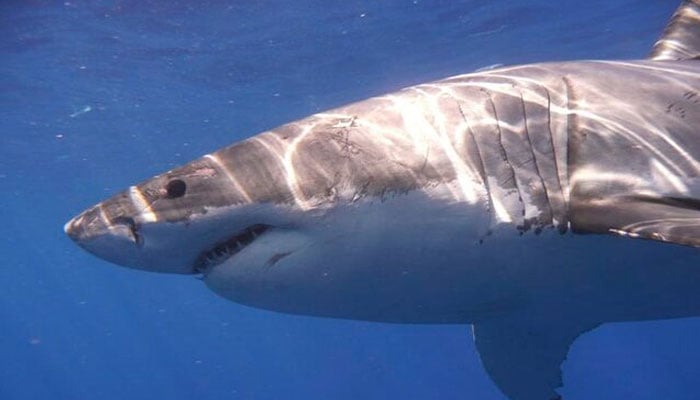Shark bite‑resistant wetsuits could cut severe injuries: study
Study published in Wildlife Research stresses suits are not "shark‑proof" and cannot prevent internal or crushing injuries
October 15, 2025

Shark bite-resistant neoprene could help reduce the severity of shark attacks and increase survival chances, a study by Australian scientists has found.
Researchers from Flinders University's Southern Shark Ecology Group tested four different 'bite‑resistant' wetsuit fabrics against white sharks and tiger sharks.
In a study published in Wildlife Research, they found that bite‑resistant materials integrated into wetsuits — incorporating high‑strength fibres such as Kevlar and ultra‑high molecular weight polyethylene — significantly reduced the proportion of substantial and critical damage from white and tiger shark bites compared with standard 3mm neoprene.
“I was a bit dubious how some kind of material could withstand the bite of a large predatory shark,” said Southern Shark Ecology Group lead researcher Charlie Huveneers.
“But I was genuinely surprised when we compare the new material to standard neoprene, at how much the new material was eliminating all of these extensive, severe or critical damage."
The study stresses the suits are not "shark‑proof" and cannot prevent internal or crushing injuries.
Whilst shark attacks are rare in Australia, they can have fatal consequences. According to the Australian Shark Incident Database, there have been 28 fatal shark attack incidents over the last ten years.
A 57-year-old surfer died on September 6, 2025 after being bitten by a shark at a Sydney beach in the most recent attack. He was pulled from the water by other surfers, but had lost too much blood and died at the scene, police said
Historically, chain mail wetsuits have been used for shark protection, however the suits were too inflexible and cumbersome for surfers. The incorporation of these new flexible materials in wetsuits could provide a more suitable option for those who require a greater range of motion.
Whilst the research concluded that the bite-resistant neoprene only provides minimal protection for ‘crushing’ injuries or bone breakages, Huveneers said this is not a reason to disregard the material.
“When it becomes a fatal shark bite and cause of death, is not from a crushing injury,” he said. “The trauma and fatalities come from blood loss… and that's what the new material can reduce is that blood loss.”
Reducing blood loss will also increase the victim’s window of survival, allowing emergency responders more time to reach the victims.
More testing still needs to be done on different species of sharks, such as bull sharks, and increasing the flexibility of the material without sacrificing on protection. However, Huveneers believes that this is a step in the right direction.
“I think it's part of a game changer, it is one of the many tools in the increasing toolbox for shark bite mitigation measures.”











